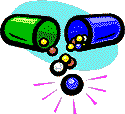 | British Regulatory Agency Echoes US FDA
Warning about SSRI Use in Young People |
 | British Regulatory Agency Echoes US FDA
Warning about SSRI Use in Young People |
|
By Ellen Kuwana Neuroscience for Kids Staff Writer December 24, 2003  Tis the season to be jolly -- but if you're not, and you're under the age of 18, be aware that new research indicates that some antidepressants may cause more harm than good. The research suggests that, in patients under 18 years, many antidepressants seem to not help or increase the rate of self-harm or suicidal thoughts. After analyzing data from the various drug companies that manufacture antidepressants called selective serotonin reuptake inhibitors (SSRIs), the Medicines and Healthcare Products Regulatory Agency (MHRA) cautioned against the use of many SSRIs in young patients with major depressive disorder. This recommendation by British government officials echoed a similar health advisory issued by the US Food and Drug Administration in October of 2003.
Why might medications approved for adults not work for children? Adults and children metabolize drugs differently, and children may have a "paradoxical" reaction to a drug, meaning the opposite of the desired effect. For example, a sedative given to a child might actually cause the child to become agitated. This recommendation has set off a debate about whether this step is too restrictive. Critics say that conclusions should not be drawn from these studies, which were conducted by different researchers at companies in different places, using different patient populations, different methods, and different ways of measuring depressive symptoms or side effects. Until more studies are completed, however, the UK and US are united in cautioning against the use of most SSRIs in young patients. Furthermore, young patients on SSRIs should be monitored by a specialist, or have their doctor consult a specialist before deciding on an SSRI. Patients who are already taking an SSRI should not stop medication without approval from a medical doctor.
| ||||||||||||||||||||||||||||||||||||
| Did You Know? | The MHRA estimates that more than 40,000 "under 18's" are taking SSRIs in the UK. Of these 40,000, about half are on fluoxetine (Prozac). |
References and Other Resources:
|
| BACK TO: | Neuroscience in the News | Exploring the Nervous System | Table of Contents |
![[email]](./gif/menue.gif) Send E-mail |
 Fill out survey |
 Get Newsletter |
 Search Pages |